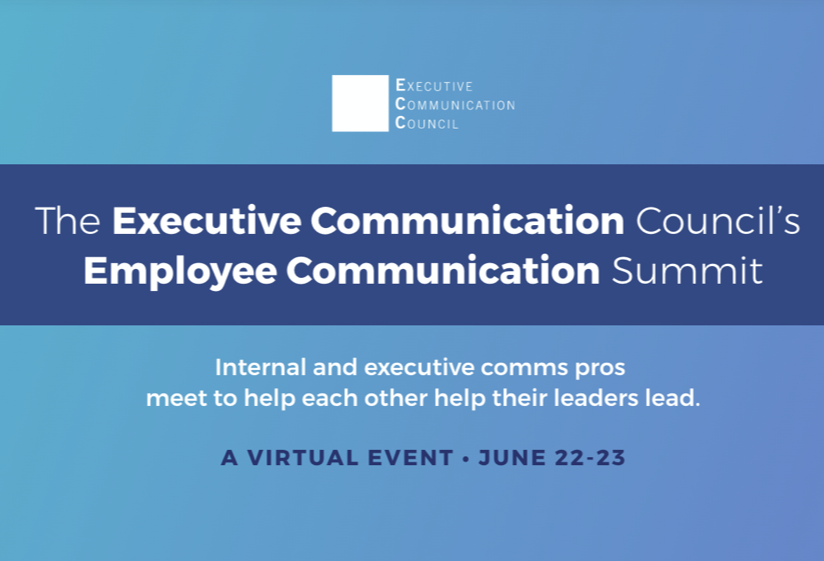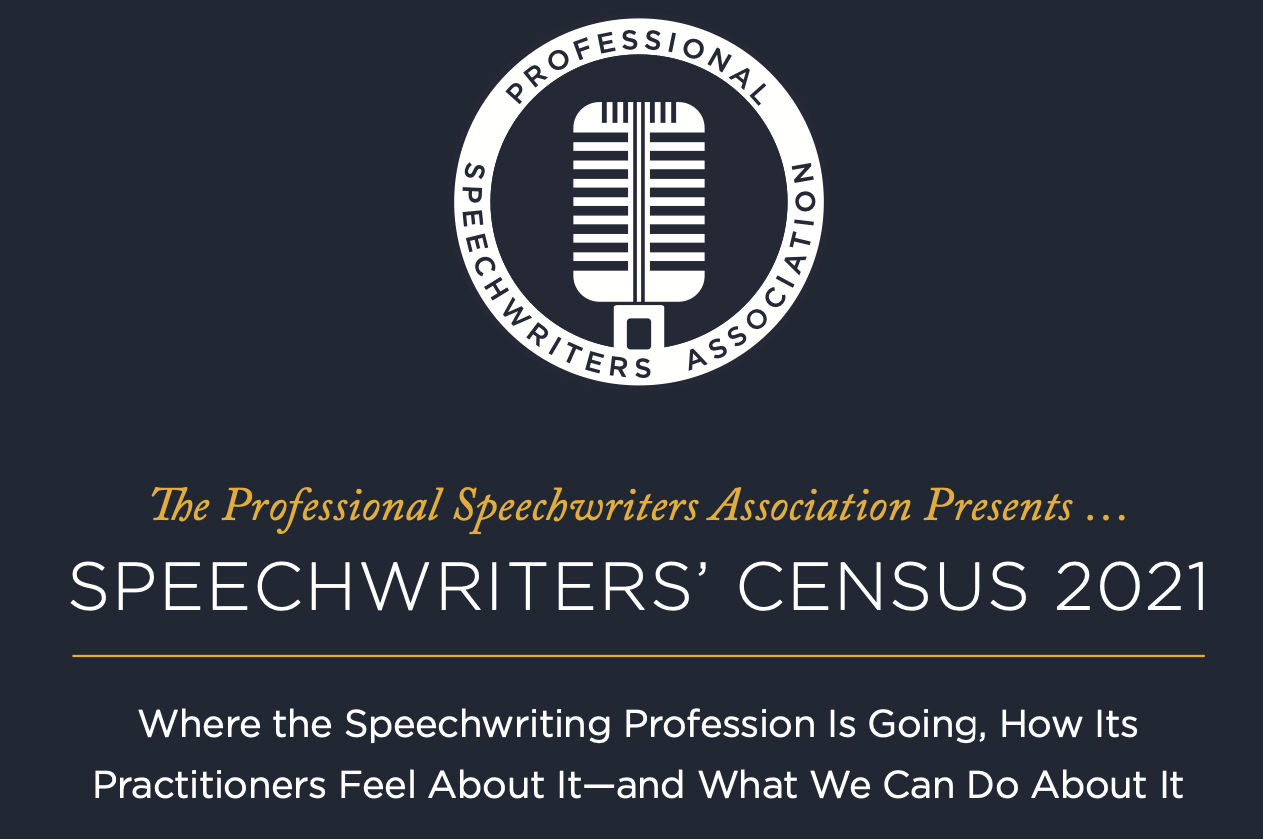The ‘Moonshot Speech’: The Reason to Take the Risk
June 29, 2022
A speechwriter breaks down the how and the why of a corporate speech that made a very big splash—and encourages you to think about writing such a speech of your own.
Last week, at the request of David Murray, I addressed the inaugural Executive Communications Summit about writing the “moonshot speech:—a goal-setting, line-in-the-sand-drawing, marker-dropping leadership declaration.
David thought this topic would be of particular interest to speechwriters, and he asked me to share what I said, with you.
To wit:
Of course, there is some irony in writing the moonshot speech … because it isn’t rocket science.
Like any other speech you need to have something to say, it needs to matter to the audience and you need to say it in a way that resonates with that audience.
There are, however, two main differences with a moonshot speech. First, the elevated importance of the thing you have to say, and, second, the potential of a career-ending faceplant.
That means it comes with huge risk, so that means you had better get it right.
And although getting it right isn’t rocket science, there is some art to it. The Web Summit speech I wrote for Ben van Beurden, CEO of Shell, in 2018, was the case study I used. You can read it here: and watch it here.
For reasons too involved to detail, Shell’s CEO decided to give a speech on ethics, it had to make a splash and it had to be done quick. Web Summit fitted in the right timeframe and is certainly big enough to make a splash, so that all fitted. The only problem was how to make it work.
The first job was to make this audience of tech folk care about the ethical perspective of a Big Oil company. The key to that was naming a truth not universally acknowledged: that Big Tech’s approach on ethics was far closer to the historical approach of Big Oil, than the current approach taken by Big Oil. That Big Oil had grown up, and that Big Tech had some very fast growing up to do.
That was clearly a relevant message for the audience, but also one they could find offensive, rather than resonant, unless we were very careful.
The first step was obvious: not to lecture Tech on its mistakes, but to implore it to learn from ours. We were the battered old grey-beard, humbled by time and experience, seeking to pass on their life lessons.
But that would only get us part-way there. We had to make the audience feel, for themselves, that their industry had enough equivalence to Big Oil to make the lessons of Big Oil worth taking in.
The job of making the audience feel equivalent started right from the opening lines.
They read:
I run an oil and gas company. Do you trust me? To produce oil and gas safely? To do the right thing on climate change?
You work in the tech sector. Do I trust you? With my credit card details? With data about my friends, and wife, and children?
I think both our industries could be doing better on trust. My industry could be doing a lot better.
To unpack that a little. The first line is humble, honest and vulnerable, calling out Shell’s biggest weaknesses up front. It is also reasonable to expect the audience to be thinking: “No, we do not trust you.”
The second line, by following the same structure, sounds balanced and fair. Critically, the speaker does not need to say he does not trust the tech industry, because the structure already makes that conclusion implicit. He also does not need to say that broader society does not trust tech. But the universality of his concerns leads the audience to that conclusion themselves.
The third line cements the equivalence of the two industries—“I think both our industries could be doing better on trust”—before removing any immediate sting with a further dose of humility: “My industry could be doing a lot better.”
The balance of these opening lines was very much the pattern of this speech. And throughout, with this balance, the message of equivalence was reinforced.
We made the case for oil and gas products, and Tech’s products. We bemoaned how energy and petrochemical products get taken for granted, and said theirs did too. We admitted to our own mistakes in fairly gory detail, and very briefly mentioned theirs as well.
Something else that helped was the word “we.” I have a speechwriting friend who likes to say that, when it comes to tricky speeches, it’s a good idea to “we” all over it. In this speech, as in many others, “we” helps bind people together.
Also helpful were humanizing metaphors.
The most obvious example comes about halfway into the speech. It reads:
But that is not to say we should fall in love with our own reflections.
True, tech has much to admire in its own reflection.
But we must all see ourselves as we truly are. That means recognising not everything about our products is wonderful.
In Shell’s case, for example, the greenhouse gas emissions that come with producing and using energy.
We must face the world, as the saying goes, warts-and-all.
This passage raises Shell up from faceless corporate entity, to a human being capable of looking in a mirror. It also brings Big Tech to the level of a human being, gazing into the mirror. And, look, we both have warts.
***
Despite suggesting to the audience that they had warts (or, to some extent, because of that suggestion), the speech was a success in the room and beyond.
I was even reliably told the Board of Facebook met to discuss the content of the speech.
But, as successful as the speech was, that does bring us crashing hard into the iron wall which marks out the limits of a moonshot speech.
Because, what did it really change?
Facebook discussed the speech, but I have not personally noticed evidence of an ethical awakening at Facebook/Meta.
The truth is, the speech itself, on its own, probably changed very little. Or, at least, very little that is very big.
But you could say the same about Kennedy’s original, literal, moonshot speech. By the time he gave it in 1962, the decision to go to the Moon had already been made, the money was being spent and NASA scientists were hard at work.
So what, actually, is the point of the moonshot speech … if it doesn’t get you to the moon?
My answer rests on a few things I learnt while working in oil and gas comm, watching what Shell did right and others got wrong.
The first is that no business can hope to communicate its way out of societal hatred. If society hates your company it probably has just cause (and it certainly did with oil and gas). To change society’s view, the business does have to be willing to change. And then actually change.
The second thing is changing that societal view will take a lot of time. The temptation, of course, is shortcuts. To come up with initiatives and ambitions, shout about them and bask in the short-term glow these provide. But this is an addictive sugar rush that can quickly leave a company with more promises than it can ever deliver.
Besides, people do not love you for who you say you want to be, but for who you are. And trust is about track record. In my view, it is better to announce your ambitions but keep the comms measured until there is a track record to communicate about.
And my final learning is that, while resisting the urge to expect adoration for ambitions, it is critically important that companies do continue to communicate the positive case for what they do and where they have made progress. If they do not, they cede the floor to the critics. And staying silent does not mean your critics will forget about you and stay quiet themselves.
They will be noisy no matter what you do, and they will not change their minds no matter what you do either. So do not worry too much about changing the minds of the critics, and certainly do not let them stop you communicating. As the great poet (Taylor) Swift said, and I quote: “The haters gonna hate, hate, hate, hate, hate.”
The opportunity to change people’s minds does not lie with the haters, and nor does it lie with the fans who love you no matter what. It lies with the people (and this is almost everybody) who have other things on their minds, the people who do not care much about you one way or the other.
And that is where the moonshot speech comes in. The whole point of a moonshot speech.
Kennedy’s speech was not really for those who thought the moonshot was a waste of money, nor was it aimed at those convinced it had to be done. It was aimed at those people who were not sure what they thought.
Done well, the moonshot speech is a powerful expression of an essential idea.
Done well, it can provide a rallying point for the great undecided to mass around.
Done well, it anchors people’s opinion exactly where you want it.
That is the great opportunity, and that is the reason to take the risk.




